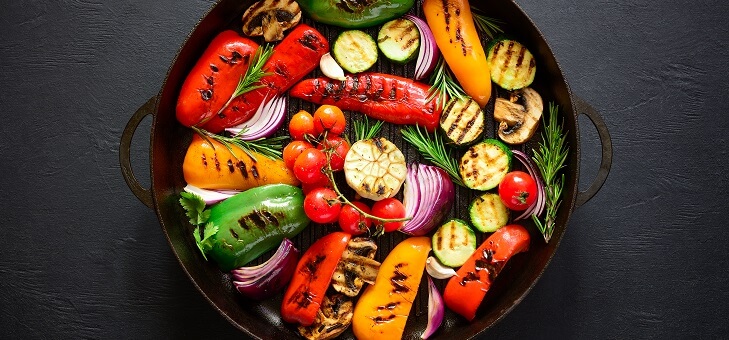There’s a vegetarian raw food movement going on right now that makes a great deal of sense.
Cooking vegetables often removes nutrients, especially when they are boiled, and changes the taste. Never tell me a cooked carrot tastes the same, only hotter than a raw one.
However, some foods are better for you cooked and here’s some of the most popular ones on our plates.
Asparagus
Cell walls break down when you cook food, releasing vital nutrients, making them easier to digest and absorb, and when you cook asparagus that’s exactly what happens. Cooking asparagus releases vitamins A, C and E and boosts antioxidant activity, which protects your cells from damage, by up to 25 per cent. It also releases phenolic acid, which has been associated with a reduced risk of cancer.
Read: Asian vegetarian noodle stir-fry
As for the smell when you go to the toilet after, we can’t help with that, you’re on your own.
Tomatoes
Tomatoes are delicious and versatile both hot and cold. Once cooked they release the powerful antioxidant lycopene, which has been associated with lowering the risk of chronic diseases including cardiovascular disease and cancer.
Cooking will destroy a lot of the vitamin C in tomatoes, but that is easily nutritionally outweighed by the amount of lycopene released.
Read: What to consider before going on a plant-based diet
Spinach
You either love it or hate it, but cooked spinach is an overachiever in the health stakes.
As well as being packed with iron, magnesium, calcium and zinc, once it’s cooked it reduces the amount of oxalic acid in the vegetable, which is a good thing, because it can inhibit the uptake of iron and calcium into the body.
Mushrooms
Mushrooms are packed with antioxidants raw but cooking them dramatically releases the overall antioxidant activities, according to a study in the journal Food Chemistry.
If that wasn’t enough, cooking them also releases higher levels of potassium, niacin and zinc.
Cooking also gets rid of the toxin agaritine found in certain types of raw mushrooms.
Celery
Celery isn’t generally considered a ‘cooking’ vegetable but maybe that should catch on because it releases plenty of antioxidants.
But celery antioxidants are fussy and only come out to play when it’s grilled, fried, microwaved or baked, basically anything but boiled which actually reduces its antioxidant levels.
Carrots
Carrots produce a substance called beta-carotene that gives it its distinctive colouring.
It turns out cooking carrots boosts the beta-carotene level, which is a good thing because the body uses it to convert it to vitamin A, vital to supporting bone growth, vision and the immune system.
Cook it with the skin on and it more than doubles the amount of antioxidant levels.
Read: Vegetarian biryani with a twist
Capsicums
Very much like carrots above, capsicums, whatever the colour, are a very good source of antioxidants and carotenoids when cooked.
Also, very much like tomatoes, their vitamin C is lost when they are boiled or steamed. Probably best roasted, because apart from all the health stuff, boiled capsicums sound dreadful.
Green beans
Better cooked because cooking them improves their cholesterol-lowering capabilities.
Once again, they are fussy. For the best nutritional uptake, bake, microwave, grill or fry them but do not boil as they lose valuable nutrients that leach into the water.
If you enjoy our content, don’t keep it to yourself. Share our free eNews with your friends and encourage them to sign up.

